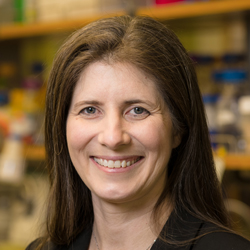A New Type of Teaching
Danielle Tullman-Ercek was named to a new Science Council for Congressman Bill Foster, who will turn to the MBP Director for her expertise in synthetic biology and engineering biology.
 Danielle Tullman-Ercek has spent her career studying and teaching chemical and biological engineering. In addition to her role as Northwestern Engineering’s Master of Biotechnology program (MBP) director, she runs a lab on campus focused on engineering microbes for the efficient and sustainable production of new therapeutics, vaccines, chemicals, and materials.
Danielle Tullman-Ercek has spent her career studying and teaching chemical and biological engineering. In addition to her role as Northwestern Engineering’s Master of Biotechnology program (MBP) director, she runs a lab on campus focused on engineering microbes for the efficient and sustainable production of new therapeutics, vaccines, chemicals, and materials.
Tullman-Ercek is used to sharing lessons with students, but she recently had the chance to share her expertise with someone new — US Rep. Bill Foster (D-Ill). The representative for Illinois’ 11th District partnered with the Federation of American Scientists to launch a Science Council, a group created to help elected politicians better understand complex scientific issues. The hope is the group can influence the policymaking process by providing nonpartisan, fact-based intel for those responsible for making important decisions.
Tullman-Ercek is one of seven members on Foster’s Science Council, serving as the subject matter expert for synthetic biology and engineering biology. Her guidance will help the legislator better understand biotechnology as it relates to microbes and viruses. The group will have regular meetings to discuss issues; the representative can also call on any of the experts for brief check-ins as needed.
“I have the ability to provide hopefully unbiased, concrete answers to the science questions they might have that are not necessarily topics that are in textbooks yet,” Tullman-Ercek said. “It feels good to be able to contribute to society in this different way but still have it be related to biotechnology."
While Tullman-Ercek’s presence on the Science Council is beneficial to Foster and the constituents he represents, it also serves as a benefit for Tullman-Ercek, her peers, and her MBP students. Working with the congressman will show Tullman-Ercek how someone influential outside the science community thinks about the field and the way it impacts the world. This different perspective will be a great asset for her as a teacher and program director.
"I will be able to relay anecdotes about how important science is to policy," Tullman-Ercek said, "as well as how policy is important to science and how it can help us take science in the directions that will have the biggest impact on the world."
The council is still young, but Tullman-Ercek already sees it influencing the way she approaches teaching. She said scientists and researchers often look for one solution to solve a host of related problems, sometimes spending years studying the issue and testing different applications. While a perfect solution is admirable, it is not always an efficient use of time or resources.
Through conversations with Foster and other council experts, Tullman-Ercek better understands the impact of multiple solutions striving to be 80 percent effective. For example, instead of creating a vaccine that covers 100 percent of the population, if one team makes a vaccine that covers 80 percent and another team creates a vaccine that covers 80 percent of the population, the hope is the overlap will actually bring the coverage to or near 100 percent.
“There is a benefit to stepping back and looking at the big picture and what’s the best path to get to your goal,” Tullman-Ercek said. “From a scientific perspective, it won’t always be a straight path, particularly once you bring in outside stakeholders.
“Being on the Science Council, I think that mindset will be very important.”

